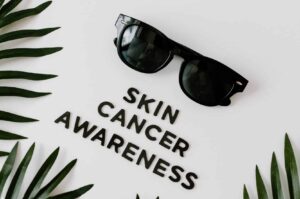Skin cancer is one of the most common forms of cancer that Americans develop. Most diagnoses are because of too much exposure to UV radiation, whether that be from the sun or indoor tanning. By using the correct sunscreen and limiting your exposure to UV rays, you can reduce your risk of developing skin cancer. But that’s not all. You can also perform at-home examinations after learning the common signs and symptoms of skin cancer, as explained below.
Skin Cancer Symptoms
Learning skin cancer symptoms can help you diagnose skin cancer early. Detecting skin cancer early can give you a much better survival rate. There are many warning signs of skin cancer, but there are a few more common symptoms that should ring alarm bells if you’re experiencing them, including:
- Mole abnormalities. If you have moles that look “off,” this could be a sign of melanoma.
- Red patches on the skin that are itchy. Not to be confused with a harmless rash, but patches that appear in one of the following ways should be screened for skin cancer: flat and yellow patches, bumps that are shiny and multicolored, pink growths with elevated sides, or sores that aren’t healing.
- Pink to purple bumps. These bumps sometimes change into sores due to Merkel Cell Carcinoma.
- Brown, red, or purple lesions appear on the face or legs.
- New growths or growths that changed in texture, color, or are starting to swell.
Schedule a screening at Rendon Center for Dermatology & Aesthetic Medicine if you have skin cancer symptoms in Boca Raton.
ABCDEs of Skin Cancer
Aside from paying attention to general skin cancer symptoms, you should also look for new growths or changes to existing moles and spots on your skin. Use the ABCDEs of skin cancer to tell if a mole could be dangerous.
A is for asymmetry. This means that the growth is not the same on each side.
B is for border abnormalities. Skin cancer spots will usually have a border that is irregular.
C is for color. The growth may have several different colors or it may change color.
D is for diameter. If the mole is more than 6 mm or changes in size, you should have it screened for skin cancer.
E is for evolving. This means that if your growth changes at all, it could potentially be skin cancer, more specifically melanoma, the most aggressive form of skin cancer. Fortunately, melanoma is highly treatable in the early stages.
Don’t Wait! Schedule a Skin Cancer Screening Today!
If you think you have any skin cancer symptoms, call Rendon Center for Dermatology & Aesthetic Medicine in Boca Raton, FL, at 561-750-0544 to schedule an appointment with a board-certified dermatologist and experienced medical team!


